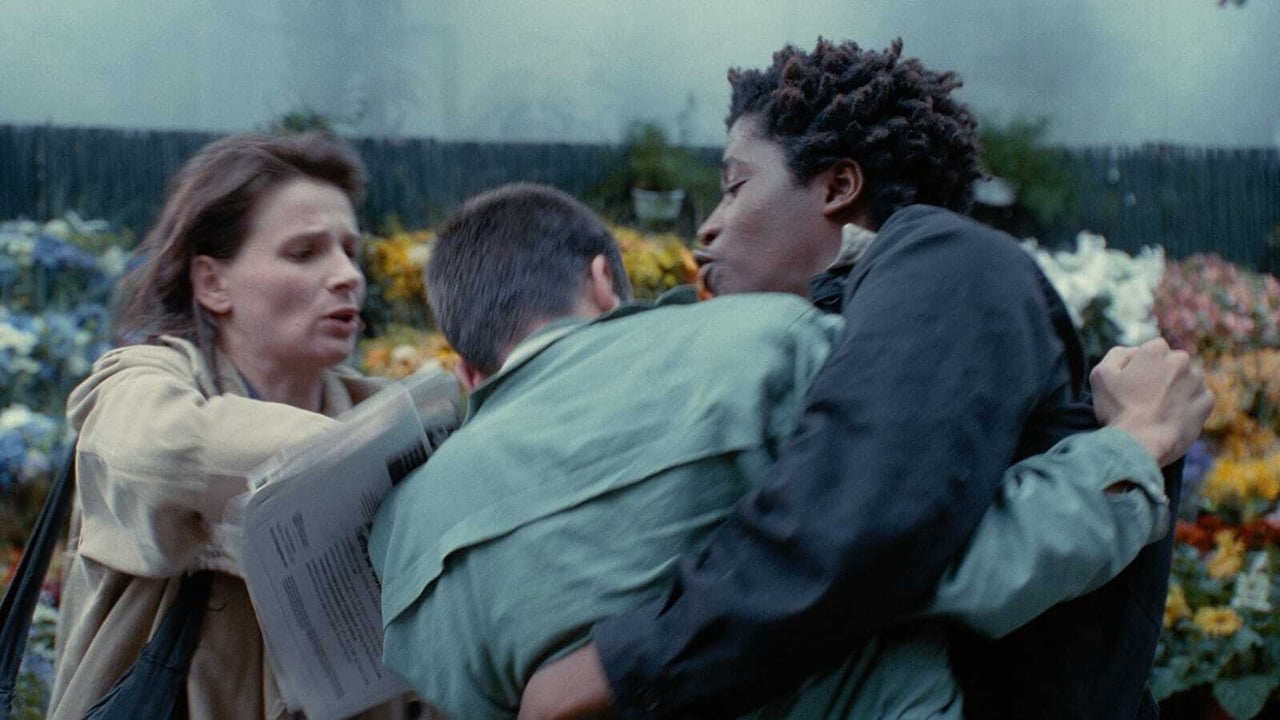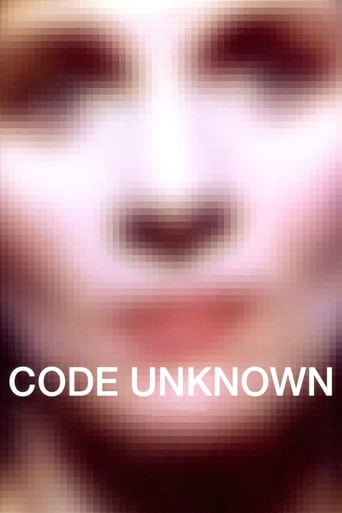

Admirable film.
... View MoreAbsolutely Fantastic
... View Moreit is the rare 'crazy' movie that actually has something to say.
... View MoreExcellent characters with emotional depth. My wife, daughter and granddaughter all enjoyed it...and me, too! Very good movie! You won't be disappointed.
... View MoreGerman art has its own fascinating charm, especially contemporary German film and most especially the Austrian subset. There's a desire for purity that creates clarity, often remarkably clear and well-machined films. The problem is that the filmmakers truly believe that this Cartesian purity brings one closer to the human condition, crisp beings that we are.So we get a shorter distance between us and the film. That's good. But there is an almost unbridgeable gap between the film and the world — any world — that matters. Herzog has figured a way around his national urge in this regard by pretty much just being nuts and making committed obsessive films about committed obsession. Tykwer escapes by becoming Polish. But Hanake is stuck.I really liked this as a film, as an artifact with craft. There's a lot of polish and refinement in what it is, how it is imagined, and the machining of the parts. It starts (and incidentally ends) with amazing panache: deaf children playing charades and unable to guess.It has some true performances, most particularly with the women around whom this revolves — including Binoche.It has some remarkable long scenes that are continuous takes, often tracking in complex ways. These are not interspersed; they are the thing itself, with many scenes of simple observation where nothing apparently happens. This allows us to really drill into the lives of these people — if they were anything like humans.The problem is in the construction. He has decided to follow an already well established structure of several casually interwoven lives. What he has uniquely done is weight every life — indeed every action in each life — as equally important. So adjusting a camera is as "important" as a shot of a farmer shooting his bulls because his youngest son has abandoned him, the last family member to do so.In wiser hands, this could have conveyed the angst of the ordinary, but it works the other way, selling the banality of the dramatic.For students of narrative folding, the chief man is a war photographer, and his photos anchor what we see in the film. His girl friend (Binoche) is an actress and we have folded in two films (a remake of "The Collector" and a fictional one that matches "real life") and a Shakespearean play about shrewish love. Wonderfully imagined, and structured, but in a mechanical universe.Vienna as an algorithm.Ted's Evaluation -- 2 of 3: Has some interesting elements.
... View MoreBoth have similar themes. They both deal with the psychological and communicative dysfunctions particular to our modern, multicultural world. Both films also deal with the suffering we create through our behavior toward one another by way of our assumptions, beliefs, and prejudices. Stylistically, however, these two films have little in common. Whereas "Crash" plays like a pilot for a TV series, weaving its characters and their stories together in support of its themes (holding our hands throughout and taking us where it wants us to go), "Code Unknown" is a puzzle in fragments that we must assemble ourselves from the information we are given. Whereas "Crash" connects too many improbable conversations and events with possible ones in order to hit us over the heads and wrench our hearts with its message, "Code Unknown" entrusts us with cinematic clues and metaphors that we must use to construct our own understanding. In "Crash" everyone tells us everything they feel and think thereby limiting the possibilities of what we are allowed to imagine. To the contrary, "Code Unknown" invites us to rely our own abilities (as perceivers) to discover what truths there are."Crash" has a few brilliant scenes, but once we have seen it there is nothing left to experience, wonder about, or really discuss. The show is over, and now we know everything about it (just as with every Hollywood film) . "Code Unknown" (like all works of art) is made up of one brilliant scene after another, but more importantly it entreats us to reflect, as well as interpret. It also invites us into conversation about it, even asks us to return and discover again.... your cinewest correspondent
... View More"Unknown Code: Incomplete Tales of Several Journeys (Code inconnu: Récit incomplet de divers voyages)" is a fascinating exploration of communication, using all the elements of film to create a trompe l'oeil of sight, sound and character interactions.We see extended vignettes of people tangentially related through an accidental intersection in Paris. In a brief interview on the Sundance Channel, where I viewed the film, writer/director Michael Haneke said he specifically selected Paris because it is one of the few European cities whose multiculturalism is so visible. We see here how it attracts immigrants not only as traditionally from the rural countryside, but now from Eastern Europe and Africa.Though not as violent as the incidents in "Amores perros", released the same year, or the later "Crash," the unsettling confrontation influences the characters' perceptions, of each other and of authority figures. We see them made sensitive to how people look, how people talk to each other, the sounds they make, and, even more importantly, shades how they interact. We see how differently people communicate with their own families, with their friends, their parents, their children, their colleagues, their lovers or their advisers, particularly through simple life cycle events.Sometimes Michael Haneke toys with us, as the camera moves back and reveals that a poignant situation isn't as dire as we thought, particularly playing on the terrific Juliette Binoche's well-known image as a beautiful actress (and yes, she does look beautiful even standing around in lingerie ironing while watching TV). Or he plays ironic tricks having deaf kids do emotional charades or perform in a marching drum band or creating ambiguity about a door entry code to reinforce a theme of restless homelessness. We see lovers who communicate passionately without words, in one lovely scene even without touching. (I wonder if this scene with these two inspired a related scene in Rodrigo García's recent "Nine Lives.") One key character is a self-righteous photojournalist (really stereotypically portrayed by bearded, hunky, disheveled Thierry Neuvic in a multi-pocketed vest with an ever-present camera around his neck) documenting ethnic cleansing in Kosovo or taking candid portraits of unaware subway passengers. But he is helpless at assisting his rebellious teen brother or sullen farmer father or estranged young son. Issues of responsibility to neighbors and passersby is viscerally shown to be not the extreme goal of stopping genocide, but rather providing dignity to a fellow human being or simply listening to what's happening next door and acting on it.Haneke provides sympathetic insight into the inner lives of African immigrants, with an ear to how happenings look different to Western rationalists than to those used to revelations of divine and interpretive meanings, particularly in dreams, or sense of time.But while he is very sympathetic to the pushes and pulls of immigration that change people's place in society from matriarch to "the gypsy" as the universal "other" who everyone higher up in society puts down, the family scenes in the Romanian village are more stereotyped, with ethnic wedding dancing.Haneke's disarmingly passive style, with almost no music or cinematic affectations (he even mocks his Dogme-style use of sound by showing actors in the film-within-a-film re-dubbing dialog lost to a passing airplane) does make us feel like voyeurs, with each vignette constructed in a single take. In the filmed interview he said the key opening scene took 32 takes before he was satisfied.
... View MoreApart from Juliet Binoche, there was nothing else to look at in this film. The rest of the cast appeared to be unknowns and amateur actors literally dragged off the street. Binoche herself seemed in a daze. What was the point of the ironing scene ? I was truly nauseated by the murder room scene. Were we supposed to think it was a fake audition set by a sicko murderer. Was her fear real ? This bordered on a snuff film at this point. This was too close to Suzy Lamplugh for comfort and I doubt the director would have gotten away with it in the UK. This unwelcome voyeuristic excitement apart the rest of the film sent me to sleep. I couldn't care less what the unknown code was linking all these bores together. I sat through all nine hours of Red, White, and Blue but this drivel left me cold.
... View More